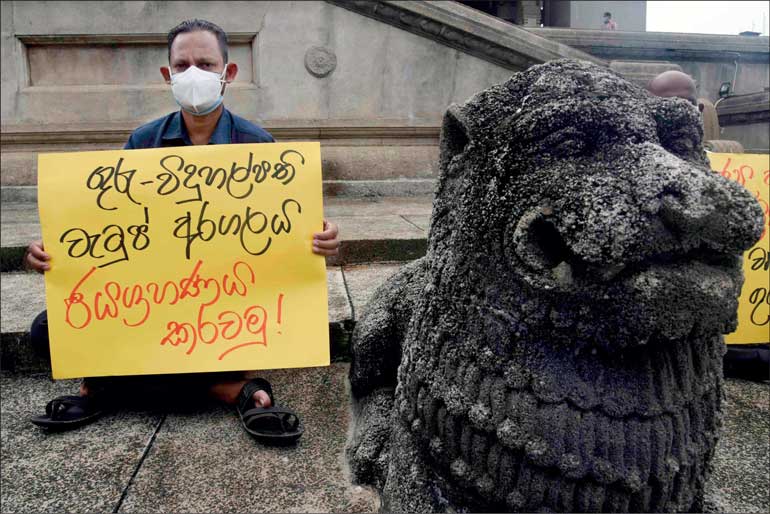Friday Feb 13, 2026
Friday Feb 13, 2026
Friday, 22 October 2021 00:00 - - {{hitsCtrl.values.hits}}

Teacher salaries are central to most aspects of school reform and school improvement and it is imperative to consider the various dimensions and how these elements of reform fit together. Therefore, increasing teacher salaries should be high priority on almost everyone’s reform agenda – Pic by Shehan Gunasekara
There are about 11,000 schools in Sri Lanka, of which around 10,000 are Government-run schools. For a few months now, Government-run school teachers have been on strike and students in these schools have had no online classes.
online classes.
Government expenditure on education in Sri Lanka is about 2% of the total GDP which is consistently lower when compared to its peers in the region and its income peers as well. One reason for the low Government expenditure is due to teachers being paid low salaries. Annual teacher salary as a percentage of GDP per capita in Sri Lanka is only 0.97% (in Bangladesh it is 2.26, in India it is 2.34, in Nepal it is 2.8, and in Pakistan it is 1.88).
Because teacher salaries are central to most aspects of school reform and school improvement, it is imperative to consider the various dimensions and how these elements of reform fit together. Therefore, increasing teacher salaries should be high priority on almost everyone’s reform agenda.
Since the pandemic began, Sri Lanka has paid little attention to the schooling system. There is currently a complete standstill in online learning in Government schools and therefore a standstill on even the idea of students going back to school physically. Such a complete standstill in education has a severe impact on students and, as usual, disproportionately so on students from marginalised and vulnerable backgrounds. But we cannot blame the teachers here.
For decades, education in Sri Lanka has been on a backburner. A proud nation of free public education, as we should be, yet we have failed to keep up with the challenges and changes in society, technology and educational progression. The public education system has many flaws, but this article will focus on teachers and teacher’s pay.
All over the world teachers are taken for granted and underappreciated for the challenges they face and obstacles they overcome. From the moment the pandemic began, there has been no assistance in teacher training, funds for the internet and electronic devices for teachers. In fact, all these additional resources came out of teacher’s pockets. Public school teachers, majority of whom are women in Sri Lanka, and with children of their own, have been expected to learn new technology, pay for their own data and additional devices with NO support from the Government. All with an expectation to teach the nation’s future. How is this humanly possible?
“This issue cannot be solved easily. It is not practical to make such demands in a situation where the Government has been affected greatly in all its income sources such as VAT, customs, excise duties and expatriate worker remittances which are the main sources of State income. It is not reasonable to boycott teaching activities due to an issue that has existed for 24 years,” G.L. Peiris said when he was Education Minister.
This statement makes some sense until you look at the allocation of resources elsewhere. While we allocate Rs. 625 million to build container gyms, when it comes to resource allocation, I think we need to agree that education should be high on the list. Education is the only way for social mobility and a future that is not dooming for us as individuals and the economy. Sri Lanka fails to look at the long-term nightmares that will dawn on us for all that we have done to our education system during this time. The pandemic could have been a great year and a half for reform in curriculums, teacher training programs and pay scales but there was none.
It is not too late still.
However, the Government should not forget that we have taken years away from our human development and social mobility for most of the population, through this long period of school closure and there needs to be damage control soon using young policy makers, including teachers, and experts in the field of education. Students don’t have a voice of their own in the public education system, but it is time we listened to students and the teachers both.
social mobility for most of the population, through this long period of school closure and there needs to be damage control soon using young policy makers, including teachers, and experts in the field of education. Students don’t have a voice of their own in the public education system, but it is time we listened to students and the teachers both.
Human capital theory
When we take a look at why we need to pay attention to our Government-led schoolteachers, a particular application of an analysis became known as human-capital theory. This theory has been a dominant way of understanding how wages and salaries are determined for many years globally. This means that earnings in the labour market are dependent on the skills and information that the population has. Workers (local population) possess and learn information and skills that contribute to a production process.
This theory dates to the time of Adam Smith and still holds; we have had plenty of time to hop on board this theory. Theodore W. Schultz introduced this stock of productive knowledge and skills possessed by workers as human capital. However, this term was mostly shaped by and American Economist named Gary Becker, who was a Nobel Prize winner for Economics and he spoke about human capital being an outcome of investment.
Becker explained that “rational” actors would make these investments if they thought future benefits would exceed short term costs associated with obtaining such skills. The most general and basic form of human capital comes from formal education, and this begins at an early age in a classroom led by teachers. Therefore, the centre of formal education is, in this case, our Government school led teachers.
The future and long-term benefits of investment in education produce a broad range of social benefits (which should be obvious) that are invaluable. It facilitates social mobility by creating opportunities for poor and disadvantaged groups to raise their economic and social status. According to the World Bank, there are vast benefits that are identified and cover a broad range of areas like social wellbeing, better political decision making, reduced crime and a higher quality of public services.
This World Bank data also suggests that education gives rise to inter-generational economic and social benefits. This means that an increased and better-quality education in one generation improves schooling, productivity of labour, followed by higher income in the following generation. Public goods in society, informational imperfections and how rewards and costs are distributed across all groups are aspects of quality education that provide an important and sufficient economic justification for why Sri Lanka should make a much higher investment in the education sector.
So why should we invest in teacher salaries?
Several international organisations argue and prove that teacher pay is central to this long-term investment. Low teacher pay is the reason for low performance, high absenteeism, low skills due to a lack of any training (especially during COVID) and low morale. Academic studies have shown that when teacher earnings increase, there is a vast range of benefits. Research conducted in recent years in various parts of the country and world has helped clarify the role of teacher pay. Many of these studies have found that increased pay is associated with:
1. Improved teacher retention.
2. Gains in student performance.
3. Strengthening teacher quality and performance
4. A larger percentage of high-achieving college students taking courses in education.
5. An increased likelihood of hiring teachers who earned top scores on their educator certification exams.
6. Attracting the best teachers
7. A higher performing economy
It is important to understand that a teacher’s salary increase is a long-term investment. As a nation, it is salient that we focus on our future and the long term even with the major short-term obstacles faced. Initially in the short term. It is essential for teachers to have access to additional training, childcare, better morale, less absenteeism, and basic cost of necessities. Eventually, you attract and retain high quality teachers.
High quality teachers directly affect quality education, and this is one of the most important determinants of economic performance in the modern world. This is true of both countries and individuals. The main characteristic which distinguishes between advanced economies, middle-income economies, and low-income countries, is the knowledge content of their production activities and processes. Education and teacher pay is at the heart of human capital accumulation and economic growth
Where do we go from here?
It is important to understand that reform beyond only teacher’s salary is needed. Combining salary increases with other critical reforms is the way to success. The World Bank highlighted how many education systems seem to be stuck in a low-learning trap, where teachers and schools lack both the support and the motivation to give students what they need.
Low teacher salaries, together with inadequate support for teachers and little selectivity in teacher preparation, can keep schools below their potential to a great extent. But increased pay is not enough. As experiences from around the world show, higher pay must be accompanied by an array of other reforms – ranging from increased selectivity into the field to more mentoring and coaching to help teachers already in the field give their best to students (teacher training programs).
Conclusion
It is unfortunate that we have had to come to a complete standstill in learning for one of our most vulnerable groups, our children. However, the re-evaluation of the policies and reform in this highly valuable and cherished sector is also long overdue.
The Government must listen to all stakeholders involved in these issues, from teachers, parents and students and make it a real priority in this crisis. The reform that can be made in the upcoming weeks can be a pivotal point for education in this country.
[Tehani Pendigrast is a graduate from University College London, UK with a MA in Education Policy and International Development and a BA in Economics from Mount Holyoke College, USA. Her former work, based in Washington DC, focused on international development in developing countries. Tehani has a passion for Education and social change and recently moved back to Colombo after 10 years and currently works in the higher education landscape.]